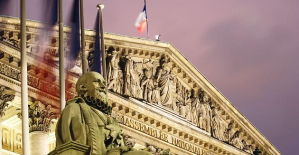On October 21, 2021, faced with soaring energy and fuel prices, Prime Minister Jean Castex announced, on TF1 at 8 p.m., the payment of an “inflation compensation” of 100 euros to the 38 million French people. earning less than 2000 euros net per month. With the clearly stated principle that this aid is received only once per person. More than a year and a half later, the Court of Auditors has just slapped the government on the wrist for... non-compliance with this rule.
“It appears from the work of the Court that the arrangements made for the payment of the inflation compensation did not ensure compliance with the principle of payment of a single aid to each beneficiary,” writes the first president of the financial jurisdiction Pierre Moscovici, in a letter addressed in July to Élisabeth Borne, successor to Jean Castex at Matignon, and made public this Wednesday. In detail, the Wise Men observed “a significant number of duplicates”, estimated at 1.7 million French people (i.e. 4.4% of the total number of beneficiaries), for an unduly paid amount of around 170 million euros. . As a reminder, this measure was initially expected to represent a cost of 3.8 billion euros for the State.
The figures from the Court of Auditors “must however be considered as a minimum”, writes Pierre Moscovici, given that the study of payments “does not include all payments”. Worse, these sums cannot be recovered by the State. “While social security organizations are the main payers of the inflation compensation, the text (of the decree, editor's note) does not provide that they can notify and recover overpayments,” regrets the Court of Auditors. It was in fact the beneficiaries who were responsible for repaying the undue sums. “On this voluntary and spontaneous basis, only 791,500 euros were recovered by the DGFiP (General Directorate of Public Finances, Editor's note), or around 0.5% of the amount of estimated duplicates,” notes Pierre Moscovici.
And the Court of Auditors pushed the government a little further, pointing out that such duplication was predictable. “The very design of the inflation bonus system exposed (...) the risk of multiple payments since the same person falling under several statuses simultaneously (employee, self-employed, beneficiary of social benefits, student, etc.) was de facto responsible to several organizations payers (employer, social security funds, etc.),” underlines the first president of the institution. At the time, the executive justified the principle of “automatic” payment of this aid by its desire to avoid creating a “gas factory”.
For the Court of Auditors, if it is too late to correct the errors made in the design of the inflation compensation, it must serve as an example, for the future, of what not to do. In the event that such exceptional financial assistance is decided again, the Sages recommend providing “the methods of exchanging data between all the organizations concerned by the implementation of the compensation”, as well as a clear legal framework. to monitor the payment of aid and the recovery of sums unduly paid. They also insist on the need for simplification, by entrusting “the responsibility for the allocation, payment, control and recovery of overdue amounts to a single national body”. At the risk of further waste of public money.

 Gaza: under the spotlight, the Israeli-Palestinian conflict shakes up the Eurovision contest
Gaza: under the spotlight, the Israeli-Palestinian conflict shakes up the Eurovision contest Black soldier killed by a police officer in the United States: the sheriff publishes the video of the arrest
Black soldier killed by a police officer in the United States: the sheriff publishes the video of the arrest In Malmö, the Eurovision party transformed into entrenched camps
In Malmö, the Eurovision party transformed into entrenched camps In Russia, Vladimir Putin stigmatizes “Western elites”
In Russia, Vladimir Putin stigmatizes “Western elites” “Mediterranean diet” or “DASH”, two good tips for eating better
“Mediterranean diet” or “DASH”, two good tips for eating better Fatal case of cholera in Mayotte: the epidemic is “contained”, assures the government
Fatal case of cholera in Mayotte: the epidemic is “contained”, assures the government The presence of blood in the urine, a warning sign of bladder cancer
The presence of blood in the urine, a warning sign of bladder cancer A baby whose mother smoked during pregnancy will age more quickly
A baby whose mother smoked during pregnancy will age more quickly Artificial intelligence lies, cheats and deceives us, and that's a problem, experts warn
Artificial intelligence lies, cheats and deceives us, and that's a problem, experts warn Google Cloud mistakenly deletes UniSuper fund account and deprives 600,000 Australians of their superannuation
Google Cloud mistakenly deletes UniSuper fund account and deprives 600,000 Australians of their superannuation IBM, Amazon, Hager... These record investments expected at the Choose France summit
IBM, Amazon, Hager... These record investments expected at the Choose France summit Boeing's black streak: a second Air France flight diverted in three days for “a smell of heat”
Boeing's black streak: a second Air France flight diverted in three days for “a smell of heat” “I want to apologize”: Kendji Girac speaks for the first time since his injury
“I want to apologize”: Kendji Girac speaks for the first time since his injury Gollum at the heart of the next Lord of the Rings film and controversies
Gollum at the heart of the next Lord of the Rings film and controversies In Paris, the redevelopment of the squares between Bastille and the Saint-Martin canal displeases some residents
In Paris, the redevelopment of the squares between Bastille and the Saint-Martin canal displeases some residents Cate Blanchett in majesty at the San Sebastian Festival
Cate Blanchett in majesty at the San Sebastian Festival Omoda 7, another Chinese car that could be manufactured in Spain
Omoda 7, another Chinese car that could be manufactured in Spain BYD chooses CA Auto Bank as financial partner in Spain
BYD chooses CA Auto Bank as financial partner in Spain Tesla and Baidu sign key agreement to boost development of autonomous driving
Tesla and Baidu sign key agreement to boost development of autonomous driving Skoda Kodiaq 2024: a 'beast' plug-in hybrid SUV
Skoda Kodiaq 2024: a 'beast' plug-in hybrid SUV The home mortgage firm rises 3.8% in February and the average interest moderates to 3.33%
The home mortgage firm rises 3.8% in February and the average interest moderates to 3.33% This is how housing prices have changed in Spain in the last decade
This is how housing prices have changed in Spain in the last decade The home mortgage firm drops 10% in January and interest soars to 3.46%
The home mortgage firm drops 10% in January and interest soars to 3.46% The jewel of the Rocío de Nagüeles urbanization: a dream villa in Marbella
The jewel of the Rocío de Nagüeles urbanization: a dream villa in Marbella Diving into the secrets of the National Assembly
Diving into the secrets of the National Assembly Institutions: senators want to restore the accumulation of mandates and put an end to the automatic presence of ex-presidents on the Constitutional Council
Institutions: senators want to restore the accumulation of mandates and put an end to the automatic presence of ex-presidents on the Constitutional Council Europeans: David Lisnard expresses his “essential and vital” support for François-Xavier Bellamy
Europeans: David Lisnard expresses his “essential and vital” support for François-Xavier Bellamy Facing Jordan Bardella, the popularity match turns to Gabriel Attal’s advantage
Facing Jordan Bardella, the popularity match turns to Gabriel Attal’s advantage These French cities that will boycott the World Cup in Qatar
These French cities that will boycott the World Cup in Qatar Top 14: powerful but not flamboyant, Stade Rochelais must find momentum in the final sprint
Top 14: powerful but not flamboyant, Stade Rochelais must find momentum in the final sprint Tennis: Djokovic, knocked out by a water bottle, is “doing well” and meets again on Sunday
Tennis: Djokovic, knocked out by a water bottle, is “doing well” and meets again on Sunday NBA: the Nuggets and the Pacers relaunch against the Timberwolves and the Knicks
NBA: the Nuggets and the Pacers relaunch against the Timberwolves and the Knicks Tennis: Djokovic knocked out by a gourd after his match in Rome (on video)
Tennis: Djokovic knocked out by a gourd after his match in Rome (on video)


















